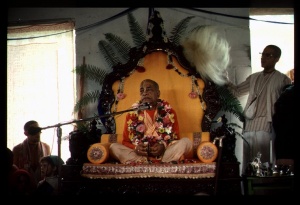CC Adi 17.154 (1975): Difference between revisions
(Vanibot #0027: CCMirror - Mirror CC's 1996 edition to form a basis for 1975) |
(Vanibot #0020: VersionCompareLinker - added a link to the Version Compare feature) |
||
| Line 2: | Line 2: | ||
<div style="float:left">'''[[Sri Caitanya-caritamrta (1975)|Śrī Caitanya-caritāmṛta (1975)]] - [[CC Adi (1975)|Ādi-līlā]] - [[CC Adi 17 (1975)|Chapter 17: The Pastimes of Lord Caitanya Mahāprabhu in His Youth]]'''</div> | <div style="float:left">'''[[Sri Caitanya-caritamrta (1975)|Śrī Caitanya-caritāmṛta (1975)]] - [[CC Adi (1975)|Ādi-līlā]] - [[CC Adi 17 (1975)|Chapter 17: The Pastimes of Lord Caitanya Mahāprabhu in His Youth]]'''</div> | ||
<div style="float:right">[[File:Go-previous.png|link=CC Adi 17.153 (1975)|Ādi-līlā 17.153]] '''[[CC Adi 17.153 (1975)|Ādi-līlā 17.153]] - [[CC Adi 17.155 (1975)|Ādi-līlā 17.155]]''' [[File:Go-next.png|link=CC Adi 17.155 (1975)|Ādi-līlā 17.155]]</div> | <div style="float:right">[[File:Go-previous.png|link=CC Adi 17.153 (1975)|Ādi-līlā 17.153]] '''[[CC Adi 17.153 (1975)|Ādi-līlā 17.153]] - [[CC Adi 17.155 (1975)|Ādi-līlā 17.155]]''' [[File:Go-next.png|link=CC Adi 17.155 (1975)|Ādi-līlā 17.155]]</div> | ||
{{CompareVersions|CC|Adi 17.154|CC 1975|CC 1996}} | |||
{{RandomImage}} | {{RandomImage}} | ||
==== TEXT 154 ==== | ==== TEXT 154 ==== | ||
<div class="verse"> | <div class="verse"> | ||
:pitā-mātā | :pitā-mātā māri' khāo--ebā kon dharma | ||
:kon bale kara tumi e-mata vikarma | :kon bale kara tumi e-mata vikarma | ||
</div> | </div> | ||
| Line 18: | Line 17: | ||
<div class="synonyms"> | <div class="synonyms"> | ||
pitā-mātā—father and mother; | pitā-mātā—father and mother; māri'-killing; khāo—you eat; ebā—this; kon—what kind of; dharma—religion; kon bale—on what strength; kara—do; tumi—you; e-mata—such; vikarma—sinful activities. | ||
</div> | </div> | ||
| Line 25: | Line 24: | ||
<div class="translation"> | <div class="translation"> | ||
"Since the bull and cow are your father and mother, how can you kill and eat them? What kind of religious principle is this? On what strength are you so daring that you commit such sinful activities?" | |||
</div> | </div> | ||
| Line 32: | Line 31: | ||
<div class="purport"> | <div class="purport"> | ||
Everyone can understand that we drink the milk of cows and take the help of bulls in producing agricultural products. Therefore, since our real father gives us food grains and our mother gives us milk with which to live, the cow and bull are considered our father and mother. According to Vedic civilization, there are seven mothers, of which the cow is one. Therefore Śrī Caitanya Mahāprabhu challenged the Muslim Kazi, | Everyone can understand that we drink the milk of cows and take the help of bulls in producing agricultural products. Therefore, since our real father gives us food grains and our mother gives us milk with which to live, the cow and bull are considered our father and mother. According to Vedic civilization, there are seven mothers, of which the cow is one. Therefore Śrī Caitanya Mahāprabhu challenged the Muslim Kazi, "What kind of religious principle do you follow by killing your father and mother to eat them?" In any civilized human society, no one would dare kill his father and mother for the purpose of eating them. Therefore Śrī Caitanya Mahāprabhu challenged the system of Muslim religion as patricide and matricide. In the Christian religion also, a principal commandment is "Thou shalt not kill." Nevertheless, Christians violate this rule; they are very expert in killing and in opening slaughterhouses. In our Kṛṣṇa consciousness movement, our first provision is that no one should be allowed to eat any kind of flesh. It does not matter whether it is cows' flesh or goats' flesh, but we especially stress the prohibition against cows' flesh because according to śāstra the cow is our mother. Thus the Muslims' cow-killing was challenged by Śrī Caitanya Mahāprabhu. | ||
</div> | </div> | ||
Latest revision as of 16:05, 26 January 2020

A.C. Bhaktivedanta Swami Prabhupada
TEXT 154
- pitā-mātā māri' khāo--ebā kon dharma
- kon bale kara tumi e-mata vikarma
SYNONYMS
pitā-mātā—father and mother; māri'-killing; khāo—you eat; ebā—this; kon—what kind of; dharma—religion; kon bale—on what strength; kara—do; tumi—you; e-mata—such; vikarma—sinful activities.
TRANSLATION
"Since the bull and cow are your father and mother, how can you kill and eat them? What kind of religious principle is this? On what strength are you so daring that you commit such sinful activities?"
PURPORT
Everyone can understand that we drink the milk of cows and take the help of bulls in producing agricultural products. Therefore, since our real father gives us food grains and our mother gives us milk with which to live, the cow and bull are considered our father and mother. According to Vedic civilization, there are seven mothers, of which the cow is one. Therefore Śrī Caitanya Mahāprabhu challenged the Muslim Kazi, "What kind of religious principle do you follow by killing your father and mother to eat them?" In any civilized human society, no one would dare kill his father and mother for the purpose of eating them. Therefore Śrī Caitanya Mahāprabhu challenged the system of Muslim religion as patricide and matricide. In the Christian religion also, a principal commandment is "Thou shalt not kill." Nevertheless, Christians violate this rule; they are very expert in killing and in opening slaughterhouses. In our Kṛṣṇa consciousness movement, our first provision is that no one should be allowed to eat any kind of flesh. It does not matter whether it is cows' flesh or goats' flesh, but we especially stress the prohibition against cows' flesh because according to śāstra the cow is our mother. Thus the Muslims' cow-killing was challenged by Śrī Caitanya Mahāprabhu.